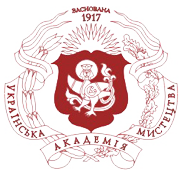Publication Ethics
Publication ethics of the collection of “Ukrainian Academy of Arts. Scientific – Methodological Research” is grounded on the recommendations for the editors of the journals, developed by the The Committee on Publication Ethics (COPE).
Publication process includes participation of many countries, each of which takes an active part in the fulfillment of the target. So, every author, editor, expert – reviewer, publisher and owner of the publishing house is responsible for keeping ethical standards at every stage of their participation.
Ethical principles for the editors.
Editor of the collection, making decision to publish an article, should check the correspondence of given material to the requirements concerning typography, scientific novelty, completeness of coverage the topic and pay attention to the credibility of the given information.
Editor evaluates the intellectual content of a work irrelevant of race, gender, sexual orientation, creed, origin, citizenship, or political beliefs of an author.
Editor and editorial board of the collection are obliged not to disclose information about accepted works without emergency to anyone except directly involved persons. Confidential information, including the ideas, received by the editor while editing, must not be disclosed, or used for personal benefits.
Editor must not take part in editing work in case of the conflict of interests concerning rivalry, common interests or other interactions or relationships with any author.
Editor must not edit a work in case there is an evidence that it is plagiarism.
Ethical principles for the authors
While proceeding the information, authors are obliged to observe rigorously the Legislation of Ukraine on protection of intellectual property and principles of scientific ethics.
Authors, submitting a work for the collection, have to show trustworthy results of their research. Obviously faulty or falsified statements are not acceptable. Information, on which a work is based, must be without mistakes.
Authors must guarantee that the results of research, given in the work of collection, are entirely original. Citation in the text have to be given with indication to the author and original source and with corresponding bibliographical citing. Any form of plagiarism and intentional borrowing is not acceptable.
Authors cannot submit a work, aimed at a different publisher house, or the one, which is currently at another publisher house, and also the work, which has already been published in another journal or based on the same research. This is considered non-ethic and unacceptable.
Authors, submitting a work for editing, must mention every person, who made contribution to carried out research in general or partially. Information, received privately, cannot be used or be given without permission of original source, as well as the information that violates the interests of the third party.
Ethical principles for the critics
Critic is obliged to evaluate the results of the research objectively and justifiably. Personal critic of an author is not acceptable.
Critic, on receiving a work for reviewing, must regard it as confidential document, which cannot be given for consideration to the third party that are not approved by editorial board.
Critics who, in their opinion, are not qualified enough to evaluate a work, must inform editorial board, asking to exclude them from reviewing process.
Critic has to pay attention of an editor to any significant similarities or coincidences, found between given work and any other published work, which is in the field of their scientific competence.
Critic cannot take part in reviewing works in case of presence of a conflict of interests, via rivalry or other relationship, joint activities or another interaction with any author.
Unpublished information, received from the works, introduced for reviewing, cannot be used by a reviewer for personal purposes without written agreement of an author.



